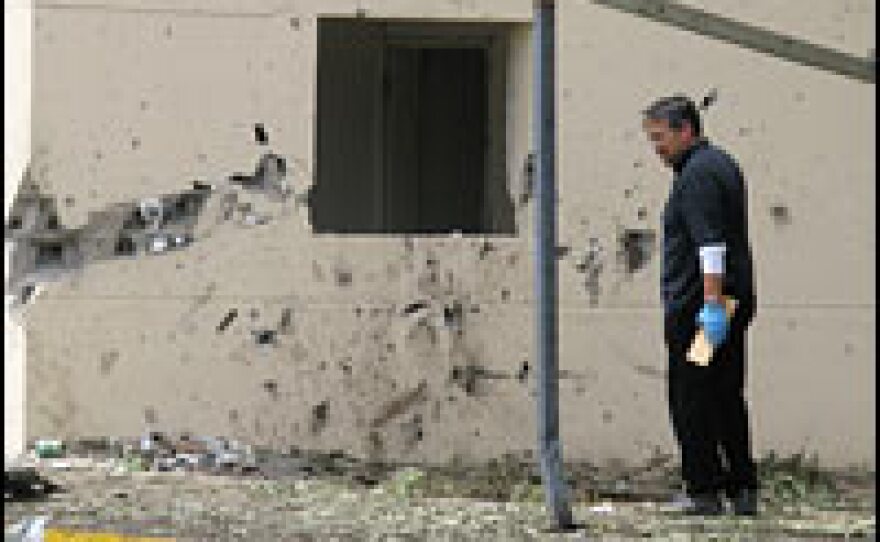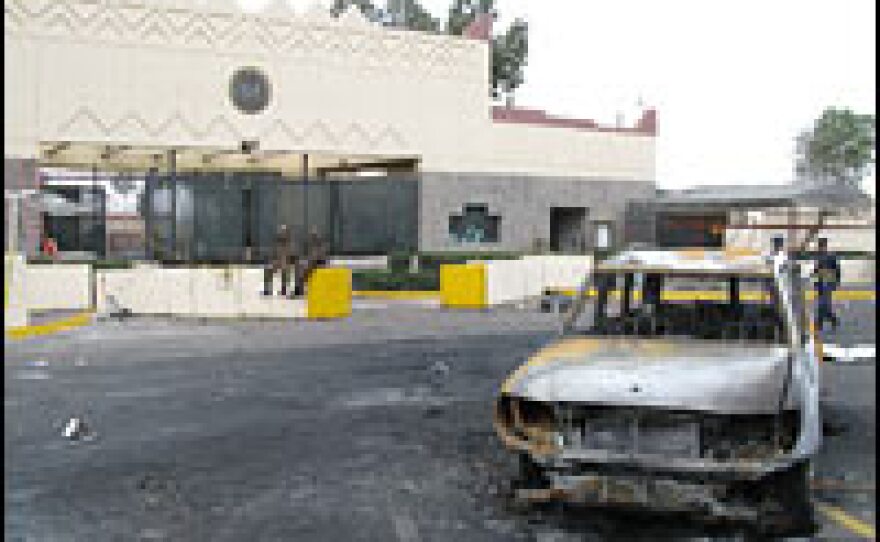
Twisted metal, bits of human flesh and burned out cars littered the street outside the U.S. Embassy in San'a, Yemen, the morning after attackers mounted a coordinated frontal assault on the heavily fortified compound.
Yemeni officials say 16 people were killed in the battle, including six local security forces and four civilian bystanders. The U.S. State Department said the assault on the compound carried the hallmarks of an al-Qaida operation.
Dozens of suspects were taken in for questioning by Yemeni security officials in the wake of Wednesday's battle.
Yemeni security forces blocked traffic around the American embassy Thursday. The surrounding neighborhood around was mostly deserted, with the exception of American investigators, who combed through the rubble under the protection of uniformed Yemeni soldiers.
The assailants launched the attack shortly after 9 a.m. local time Wednesday, when they pulled up to the main gate leading to the embassy parking lot, and shot and killed a guard there. The attackers then lifted a drop bar and aimed their car filled with explosives at an armored Yemeni security vehicle parked just outside the main gate of the embassy.
After the initial explosion, a second vehicle, carrying armed passengers, rolled into the parking lot. Eyewitnesses heard at least four explosions as attackers detonated explosive suicide vests and fired machine guns at the main gates. There were three bullet holes in the reinforced glass of the embassy's guard booth and what appeared to be blood stains on the embassy's outer walls.
Yemeni officials say the dead included an 18-year-old American high school student named Susan Elbaneh. She had traveled from her home in Lackawanna, N.Y. — outside Buffalo — to marry a Yemeni man.
Peter Hazzan, the principal of Lackawanna High School, told The Buffalo News that Elbaneh was at the U.S. Embassy with her husband, filling out paperwork to move back to the U.S., when the battle erupted.
This was the fifth attack since 2002 on the U.S. Embassy. Last March, someone lobbed mortars at the compound and narrowly missed, striking a nearby school.
Over the last year, groups linked to al-Qaida have stepped up violence against foreign targets in Yemen, attacking oil installations and foreign tourists.
Since the Sept. 11 attacks in the U.S., the Yemeni government has been an ally in the Bush administration's war on terrorism. But American officials have criticized San'a for releasing several high-profile individuals who were convicted of attacks on American targets.
Yemen is the poorest of the countries on the Arabian peninsula. The central government's authority over its own mountainous territory is weak.
In past decades, Yemen has been divided by civil war, and the Yemeni government struggled over the years to control insurgencies and violent protests in the north and south of the country.
Copyright 2022 NPR. To see more, visit https://www.npr.org. 9(MDAzMjM2NDYzMDEyMzc1Njk5NjAxNzY3OQ001))







